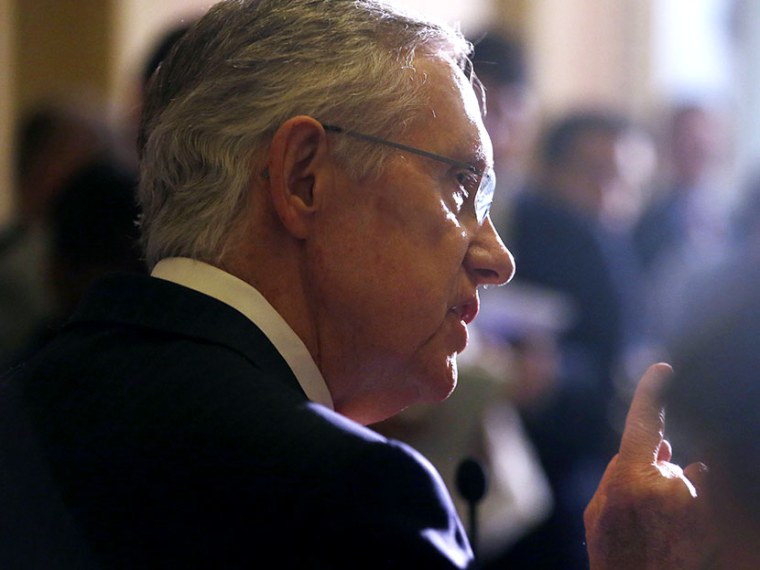Updated July 18, 1:19 pm
Senate Majority Leader Harry Reid did not carry out his threat to change Senate rules to reduce or eliminate Senate filibusters. This was not entirely unexpected. What did he get in return?
Reid got Senate confirmation of Richard Cordray as director of the Consumer Financial Protection Bureau. Cordray has been in the job for two years as a recess appointment. The legality of that recess appointment was in some doubt, and in any case, Cordray faced eviction next year without Senate confirmation.
Reid also got a promise that Republicans wouldn’t filibuster Labor nominee Tom Perez; Environmental Protection Agency nominee Gina McCarthy; Export-Import Bank Chairman Fred Hochberg; and National Labor Relations Board Chairman Mark Gaston Pearce. The latter two's continuation in their respective posts requires that they be re-nominated and re-confirmed.
Those concessions are considerably more than what Reid extracted from Republicans when he (twice) made similar threats before. But they still aren’t enough to justify scuttling filibuster reform.
Was it even necessary?
Perez and McCarthy (according to Senate Minority Leader Mitch McConnell) already had the necessary 60 votes to beat a GOP filibuster.
Cordray had a filibuster-proof majority, apparently; he was confirmed 66-34, with the support of 10 of the 43 Republicans who last February vowed not to confirm Cordray unless the CFPB’s powers were diminished significantly. Whether Cordray could have counted on those 10 Republicans in the absence of the bipartisan agreement is anybody’s guess, but he needed only six of them to beat a filibuster.
Hochburg’s re-confirmation, held up because the libertarian Club For Growth doesn’t believe the Ex-Im Bank should exist, was always likely to go through in the end because the U.S. Chamber of Commerce (which does think the Ex-Im Bank should exist) supported it.
That leaves the NLRB. Pearce’s promised re-confirmation is good news, but the GOP insisted that the nominations of NLRB members Sharon Block and Richard Griffin, two recess appointments whose legality, like Cordray’s, was in doubt, be withdrawn. President Obama hastily replaced them with two other nominees, Nancy Schiffer and Kent Hirozawa. In exchange, Republicans have pledged to support an up-or-down confirmation vote.
Whether the GOP will honor that pledge (whose precise wording--which I’ve been unable to obtain--seems to vary according to news accounts) remains uncertain because the Republicans’ objection was never to particular nominees but to the NLRB’s ability to maintain a three-member quorum beyond next month. (The GOP is not keen on an NLRB that actually enforces existing labor laws.) Republicans do not appear to have agreed to vote on two additional nominations for the NLRB, which is too bad, because the NLRB is actually supposed to have five members.
Presumably if Republicans try to filibuster Schiffer or Hirozawa (or Pearce), Reid will say that they’ve reneged on their agreement and either make his threatened rule change to block the filibusters or begin another protracted negotiation (probably by proxy through Sens. John McCain and Chuck Schumer, who struck the current deal because Reid and McConnell were barely speaking to one another).
Reid’s deal is merely a delay of the final reckoning, because it’s increasingly obvious that the Senate will never function properly under any party until it changes its filibuster rules. Reid is determined to put off that necessary change as long as he possibly can. That was apparent from Reid’s July 15 remarks at the Center For American Progress. Reid insisted he was only considering elimination of the filibuster for executive-branch confirmations; judicial confirmations (which extend past a presidential term) could still be filibustered, as could legislation. Indeed, Reid reaffirmed his support for the 60-vote cloture requirement in these other areas because it “protects progressive groups and conservative groups.” He was only threatening this one reform, he said, because Republicans were abusing the filibuster on nominations.
But in fact, the filibuster has been abused by both Republicans and Democrats in recent years, on Cabinet nominations, judicial nominations, and legislation. Asked whether the GOP might eliminate the filibuster if it regained the Senate, Reid said “they would rue the day they did it.” The more practical and statesmanlike response would have been, “Republicans would deserve the same majority-vote norm that we Democrats seek, and that both parties have largely enjoyed in the past.”
The Senate has gotten addicted to filibusters. Both sides need to swear off the bottle. But Reid knows Democrats will one day be in the minority once again. When that happens, he’ll still want a frequent taste of his own.
